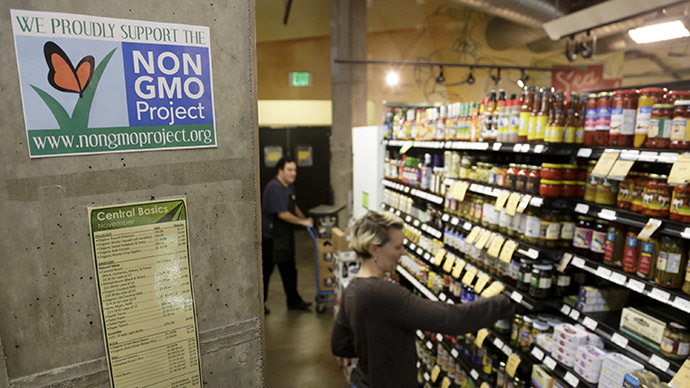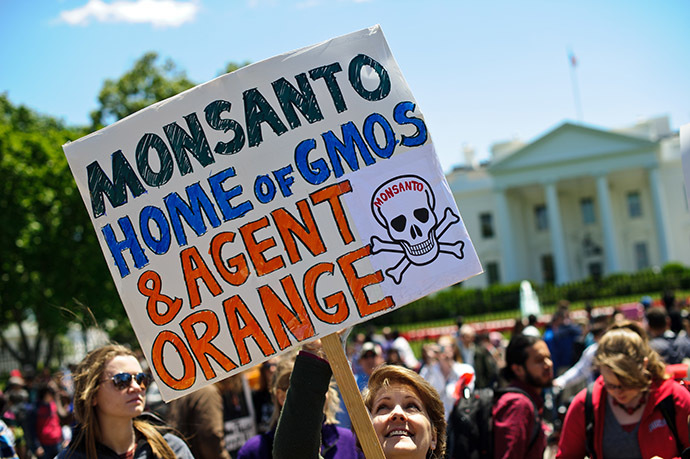Illegal pro-GMO observers accused of disrupting Oregon labeling law vote count

Amid a recount of Oregon’s ballot initiative over labeling of genetically-modified foods, the pro-agribusiness contingent, known as the No on 92 Coalition, tried to illegally place out-of-state election observers in at least four counties, opponents say.
The statewide vote on Measure 92 - which, if passed, would demand genetically-engineered ingredients to be labeled as such - is subject to a hand recount given the original, computerized tally showed that the initiative failed by just 812 votes, within the mandatory-recount margin. The recount began on Tuesday and will continue through Dec. 9.
The campaign over Measure 92 was the most expensive in the state’s history, as powerful biotechnology firms like Monsanto and DuPont pumped about $21 million against the initiative, while supporters culled about $9 million.
According to Oregon law, each campaign can select observers to watch firsthand the recount in each county, but those observers must be registered Oregon voters.
Yet, as the Statesman Journal reported, the pro-labeling supporters of the measure, including Dave Murphy of Food Democracy Now, said the No on 92 Coalition sent out-of-state observers to register and appear at recounts in Benton, Linn, Marion and Multnomah Counties.
"The issue was brought to our attention by the Yes on 92 campaign on Friday, Nov. 21," Tony Green, spokesman for the Oregon Secretary of State's office, told the Statesman Journal.
Green said the state’s Election Division director affirmed that all authorized observers must be registered Oregon voters.
"The No campaign learned of this within a day or two. They had the week prior to the recount with knowledge of it," he said. "We then put it in writing to the county clerks on Monday in case there was any uncertainty over the issue."

In Marion County, Clerk Bill Burgess allowed one out-of-state observer for each campaign to sit off to the side of the room where the recount took place. The request came from Salem lawyer Kevin Mannix, according to reports.
"When I looked into it with our legal counsel we found it was fine to allow them in the room," Burgess said.
Though one of the observers that Measure 92 opponents put forth in Marion County was a man named John Hewitt from Virginia, Burgess said. The director of state affairs for the Grocery Manufacturer’s Association, a powerful trade group that protects the interests of GMO-labeling opponents, is also named John Hewitt. The lobby group could not be reached for comment, the Statesman Journal reported.
Meanwhile, in Benton County, Clerk James Morales worked with a Eugene lawyer to allow out-of-state observers to stay involved.
"We are allowing them to sit in the foyer area where we have a monitor set up that shows the recount room," Morales said. "We're not letting them into the actual counting room."
In Multnomah County, eight members of the California political consulting firm GOGO Consulting signed up for recount training.
Multnomah County Elections spokesman Eric Sample said they were not sanctioned by the campaign, but were allowed to watch from an observation area.
One out-of-state resident tried on Wednesday to be an official observer, Sample added.
An observer for the Yes on 92 campaign also complained of verbal abuse directed at election workers from her counterpart for the No on 92 campaign.
"If that occurs we deal with it," Sample said. "Both observer sides have been very well behaved."
The narrow failure last month of Measure 92 in Oregon marked one of two GMO-labeling voter initiatives that fell short on Election Day.
In Colorado, 66 percent of voters were against a measure that would have mandated labeling of food that contains genetically modified crops, as 34 percent voted in favor. Prior to the election, a Denver Post poll found 59 percent of voters were opposed to GMO labeling in the state. Proposition 105 would have required food companies to label packaged foods with text reading, “produced with genetic engineering.”
One labeling effort succeeded last month, in Hawaii’s Maui County, though Monsanto and Dow Chemical quickly sued the county despite voters’ wishes.
“We believe this referendum is invalid and contrary to long established state and federal laws that support both the safety and lawful testing and planting of GMO plants,” Monsanto wrote. “If effective, the referendum will have significant negative consequences for the local economy, Hawaii agriculture and our business on the island. We are committed to ongoing dialogue as we take steps to ask the court to declare that this initiative is legally flawed and cannot be enforced.”
Similar labeling measures have failed in other states as well. Voters in California and Washington State rejected them in 2012 and 2013, respectively. However, amid a wave of concern over GMO foods sweeping through the US and around the world, agricultural giants lobbying against the measures have spent over $100 million fighting the measures nationwide.














